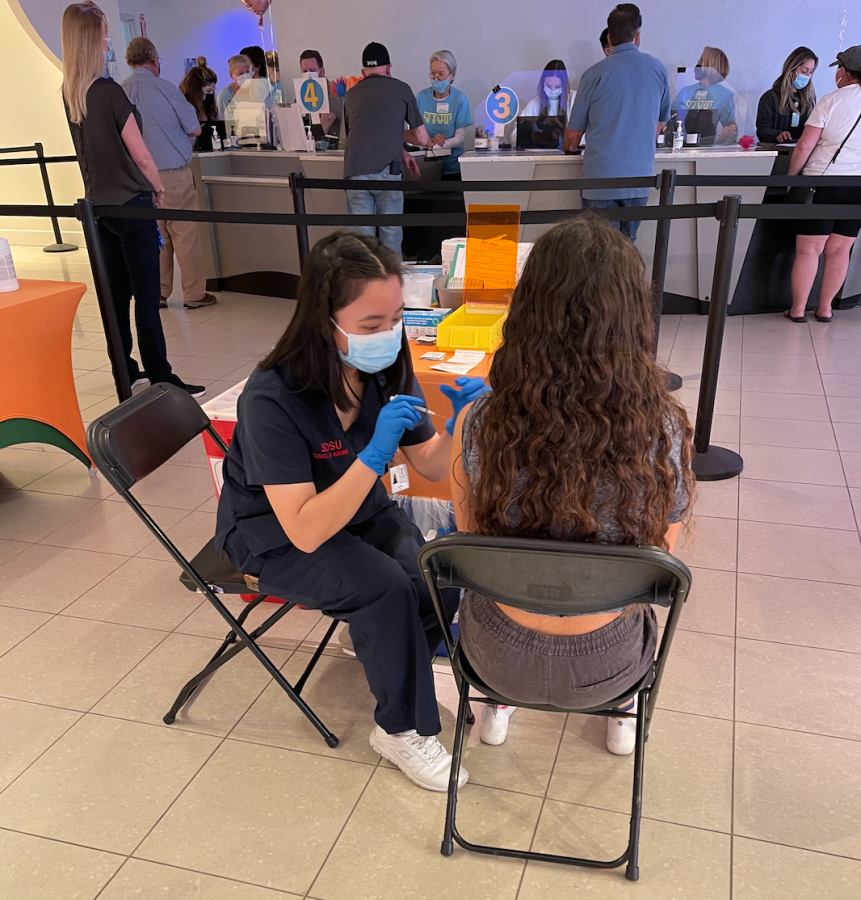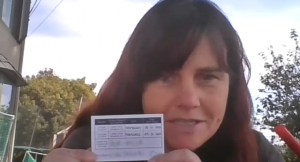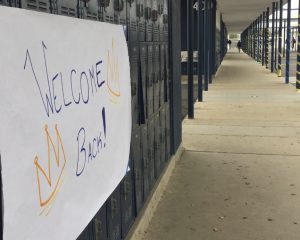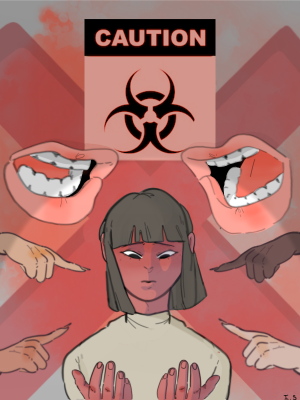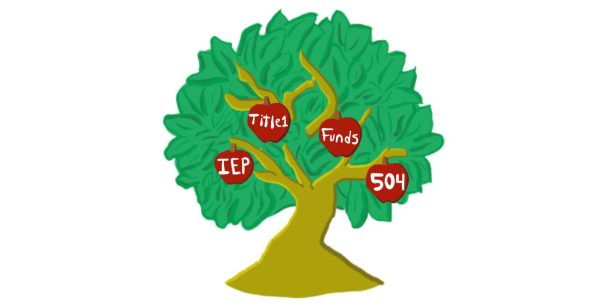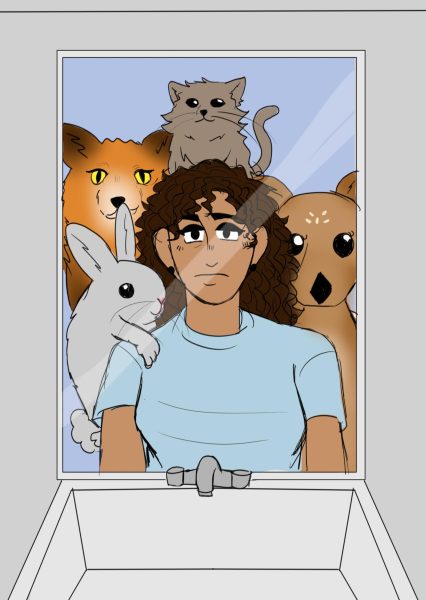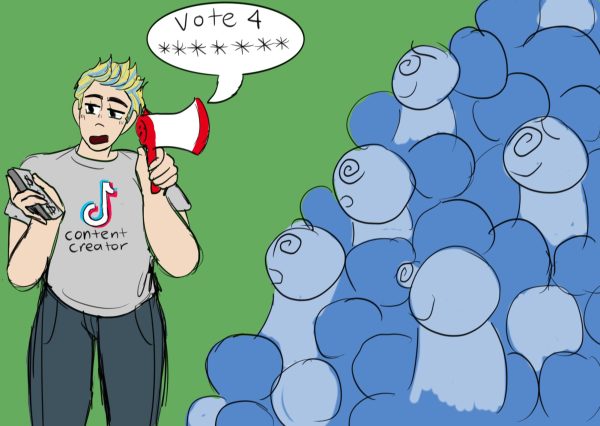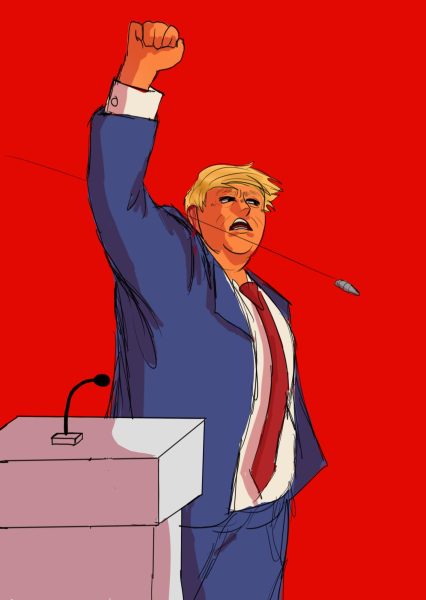Give it a shot
BVH students should receive their COVID-19 vaccine
Junior Lourdes Castruita receives her first dose of the Pfizer Vaccine at the Grossmont Sharp Clinic. In the background other people wait to get their vaccines.
A simple needle with a great deal of promise—economically and health-wise. A quick shot that has the potential to save millions of lives. This is the COVID-19 vaccine, which should be encouraged to all students qualified to receive it.
To decrease the spread of the virus, Bonita Vista High (BVH) students and the San Diego County were issued into quarantine on March 13. However, adapting to a life with less human contact is not the only solution to eradicating the virus and getting back to life before the pandemic.
This is shown by the fact that more vaccines are expected to be released in the future. According to the Los Angeles Times vaccinations are available to people ages 16 and above as of April 15 in California. Thus, sophomores, juniors and seniors are now eligible to receive their vaccination.
California residents are on the right path in the fight against COVID-19. According to CBS8 News, more than 5 million doses have been given out in California. The new vaccines require two doses, three to four weeks apart, for each person. The CDC encourages those who are eligible to receive their vaccine, as it is one of the major resources to not only combating COVID-19 but also a step back into normalcy. There are still ongoing studies examining how vaccines can impact the spread of COVID-19. Once students are vaccinated, they will be able to resume certain activities that they might have put on hold due to the pandemic.
There are different variations of the COVID-19 vaccine, as the CDC states, there are three different brands that offer the vaccine; Pfizer-BioNTech, Moderna, and Johnson & Johnson’s Janssen (J&J). The Pfizer-BioNTech is currently the only company that is offering it’s vaccine to those who are 16 and older. This vaccine requires two shots that should be given three weeks apart alongside a two week waiting period after injection in order to be fully vaccinated.
COVID-19 vaccinations will help protect students by creating antibodies or an immune system response without having to experience life-threatening symptoms, according to the Centers for Disease Control and Prevention (CDC). Vaccines function in conjunction with the immune system to prepare the body to combat infections.
COVID-19 has the potential to cause life-threatening complications. When people get ill from the virus, they risk spreading the virus to their friends, relatives and others they come in contact with. To stop a pandemic, any available instruments like vaccines, must be used for the safety of all.
As junior Lourdes Castruita walked to the Grossmont clinic to receive her first dose of the Pfizer vaccine, she noticed the short line of people patiently waiting for their turn to receive the vaccine. The staff then led her to the check-in counter for her appointment. As she gave them her identification card, they filled out paperwork. They then took her to the area where they administered the vaccine. She was asked which arm she wanted to receive the vaccine and once she was done, they walked her outside to a waiting area to see if she had any symptoms.
Fortunately, there are no life-threatening effects of the Pfizer vaccines known now. According to the CDC data from the FDA Pfizer clinical vaccine trial, 88.7 percent of participants ages 18 to 55 registered at least one local response, such as pain or redness on the injection site, 82.8 percent of younger participants reported systemic adverse events such as nausea, headache and body pain, which are all side effects common to the flu shot.
“It didn’t physically hurt when I was getting the shot. I [thought to myself], ‘Finally, I’m getting it.’ The only symptoms I [experienced] after [getting the vaccine] were [fatigue] and body aches,” Castruita said.
Although Castruita received her vaccine before it was available to those ages 16 and up, she needed to get vaccinated because she volunteered at the regional office for PepsiCo, a food and drink corporation. That being said, she still believes that it is important to receive the vaccine once students are eligible.
“We’re not going to have that many symptoms because we’re younger. [Although, when people get] vaccinated, [they are] not immune [to the virus], but [they’re] less prone to get it, which means that [they] can [start to] do more things,” Castruita said.
The CDC advises that once those who are eligible have been fully vaccinated for COVID-19, they should still take special precautions in public places and continue minimal contact with others.
“As more and more people have the vaccine, more people will be protected, more things will start opening up and normalcy will return into our daily lives,” Castruita said. “It’s a way to control the spread of the coronavirus, which is always something that should be prioritized.”
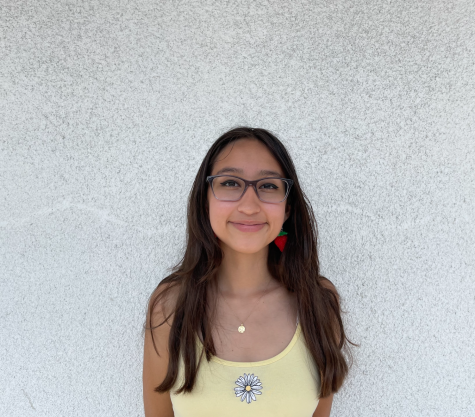
I am a senior at Bonita Vista High and this is my second year on staff. I’ve always liked how unbiased and informative the crusader was and it was a...

